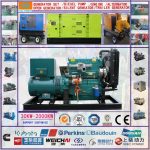Diesel Generator for Transient Response A Comprehensive Guide

Introduction
Diesel generators play a crucial role in providing backup power during electrical outages or in remote locations where access to the grid is limited. One important aspect of diesel generators is their transient response, which refers to how quickly and effectively they can respond to sudden changes in load demand. In this article, we will explore the concept of transient response in diesel generators, its importance, factors affecting it, and strategies to improve it.
Understanding Transient Response

Transient response in diesel generators is the ability of the generator to quickly adjust its output in response to sudden changes in load demand. These changes can occur due to fluctuations in power consumption, starting of heavy equipment, or sudden connection or disconnection of loads. The transient response of a diesel generator is crucial to ensure a stable and reliable power supply, especially during critical operations or emergencies.
Factors Affecting Transient Response
Several factors can influence the transient response of a diesel generator. Some of the key factors include:
1. Engine Design: The design and specifications of the diesel engine used in the generator play a significant role in determining its transient response. Factors such as engine size, power output, fuel efficiency, and combustion process can impact how quickly the engine can respond to load changes.
2. Governor System: The governor system of a diesel generator is responsible for controlling the engine speed and output based on the load demand. A well-designed governor system can help improve the transient response of the generator by efficiently adjusting the fuel supply to match the load requirements.
3. Fuel System: The fuel system of a diesel generator, including the fuel injection system and fuel delivery mechanisms, can affect the transient response. Proper fuel management and delivery are essential for ensuring that the engine receives the required fuel to respond quickly to load changes.
4. Cooling System: The cooling system of a diesel generator is crucial for maintaining optimal engine performance and temperature regulation. An efficient cooling system can help prevent overheating and ensure that the generator can respond effectively to sudden load variations.
5. Generator Synchronization: In applications where multiple generators are connected in parallel to supply power, proper synchronization is essential to ensure smooth operation and optimal transient response. Synchronization controls the output of each generator to maintain a balanced load distribution and prevent voltage fluctuations.
Strategies to Improve Transient Response
To enhance the transient response of a diesel generator, several strategies can be implemented. These strategies focus on optimizing the engine performance, improving control systems, and enhancing overall system efficiency. Some common strategies to improve transient response include:
1. Proper Sizing: Ensuring that the diesel generator is properly sized based on the expected load requirements is essential for optimal transient response. An undersized generator may struggle to meet sudden load demands, while an oversized generator can lead to inefficiencies and fuel wastage.
2. Regular Maintenance: Regular maintenance and servicing of the diesel generator are crucial for maintaining peak performance and optimal transient response. Routine inspections, oil changes, filter replacements, and other preventive measures can help identify and address potential issues before they impact the generator's response time.
3. Upgrading 200kw diesel generator for sale : Upgrading the governor system, fuel management system, and other control components can help improve the transient response of a diesel generator. Advanced control systems with predictive algorithms and real-time monitoring capabilities can enhance the generator's ability to adjust to load changes quickly and efficiently.
4. Fuel Quality Management: Ensuring the use of high-quality fuel and proper fuel storage practices can prevent fuel contamination and degradation, which can affect the performance of the diesel generator. Regular fuel testing and treatment can help maintain fuel quality and improve the transient response of the generator.
5. Load Testing: Conducting regular load testing and performance evaluations can help identify any weaknesses or inefficiencies in the diesel generator system. Load testing simulates real-world load conditions and allows operators to assess the generator's transient response and overall performance under varying load scenarios.
Conclusion
In conclusion, transient response is a critical factor in the performance and reliability of diesel generators. Understanding the factors that influence transient response and implementing strategies to improve it can help ensure a stable and efficient power supply in various applications. By optimizing engine design, control systems, fuel management, and maintenance practices, operators can enhance the transient response of diesel generators and mitigate the risks associated with sudden load changes. Diesel generators will continue to play a vital role in providing backup power and emergency support, making transient response an essential consideration for power system operators and engineers.
